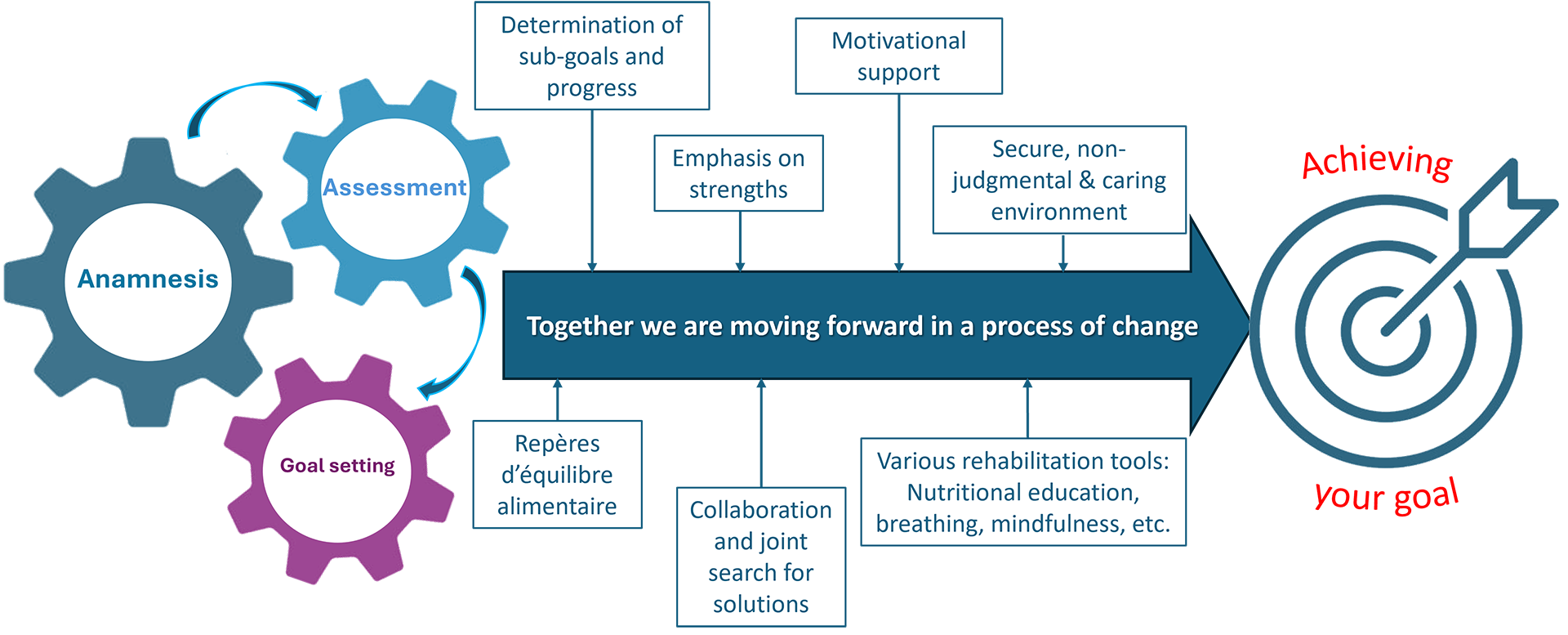Conscious eating behaviors
Eating Disorders and Emotional Eating, although quite different in their causes and experiences, are 2 disturbed relationships to food that require specialized support.
This support will of course depend very much on your problem, your history and its evolution, as well as your commitment to care, but the broad outlines can be summarized as follows:

Eating disorders
What is an eating Disorder ?
The eating disorders (EDs) are psychopathologies (referenced in the manuals diagnostic psychiatry), which include, in particular, the’anorexia nervosa, the bulimia, l’binge as well as partial forms, mixed or atypical.
It may be that you have it’s hard to know if you suffer from any of these disorders, especially if the form of the pathology is partial. Only a psychiatrist is qualified to make a diagnosis and I am at your entire disposal to guide you to one of them if need.
It is, however, possible to give here a brief definition of the major disorders.

L’anorexia nervosa is characterized by a voluntary restriction of food intake, both in quantity and quality, often accompanied by hyperactivity, and leading to a loss of weight (sometimes extremely important). Associated with an intense fear of return to a “normal” weight, weight perceptions, and body shape is altered. Anorexia can
drive or mix it with a disorder bulimia.
Bulimia is defined by episodes of repetition of binge eating, with a sense of loss of control. To avoid weight gain, eating a very large amount of food is followed by compensatory behaviours such as vomiting, excessive intake of laxatives, fasting, or physical activity.
Binge eating disorder is an ED close to bulimia, but which is distinguished by different aspects, including the fact that there was no recourse (or very little) to compensatory behaviours.
Can we get out ?
Like many, you are probably wondering if it is possible out of it
My answer is yes ! And I rely so much on what one finds in the literature that on my 20 years of practice.
The mainstay of therapy is, of course, the psychological care with a psychologist and/or psychiatrist. So far, this complex pathology also requires the intervention of general practitioners and specialists, as well as a support dietary specialist. It is not uncommon that adds a dimension body with the help of a(e) psychomotor therapist(do).
The complexity of these pathologies fact that it is difficult to go it alone(e). But with a tailored support and, of course, your commitment in the care you can clearly hope let the ED behind you.
For all that, don’t delay. The less you wait to treat you, more you increase your chances of success.
What can you expect from nutritional advice ?
Consultations of dietary consist of :
- Help to weight regain, especially in anorexia : neither too slowly as it takes the results, neither too quickly to remain bearable ! It will be necessary to ultimately reach a weight where possible normal for your height and age, at least acceptable, physically and psychologically.
- Restructure little by little your diet : rate, structure, and meal preparation, acquisition of autonomy for meals outside the home, etc
- Re-educate gradually your food behavior : image and acceptance of food, food diversification, table manners and meals in the daily, lived experience of the festive meals, restaurants and eat buffets, etc
- Integrate mindfulness to reduce the dimension anxiodépressive and especially to regulate emotions and impulses in the pathologies of type bulimic
The support dietary anorexia nervosa must take into account both the medical necessities including weight regain but also your fears, your brakes, your hitches. You’ll have to leave a little in your area
comfort, of course, to move forward, but we move at your pace, taking into account your blockages. The objectives cover both the increases in the quantity and diversification qualitative or problematic situations that you encounter in your daily life. It will also work on the cognitions and false beliefs around food and conveniently introduced by the breath including better management of anxious situations and a look at itself more benevolent.

cover of the binge and binges is different, made more complicated in particular by the loss of control that occurs, amounting sometimes to a state of trance. It will be important to set the framework and guides for food and to find the rhythm and structure of the meal. But it will also, and this is without a doubt the most difficult, learn how to press the pause button, accommodate and face it with courage and it is disturbing to learn how to regulate emotions and control impulses.
The aim of counselling is to lead you to your objective, which, in the majority of cases, is to allow you to reconnect with a social life enjoyable, of respond with joy to the invitations without torture you in advance what it will be or not to eat, you release obsessions food, restrictions and compulsions you are ruining the life during and between each meal … When the pathology has evolved over many years, the goal may be a little less ambitious, but he remains focused on improving the symptoms and quality of life.
The 1st consultation allows to trace the history of the disorder, ask a balance sheet and raise your expectations, and motivations. After you have clarified your final objective, we determine together the 1 st not to do. Then, during different follow-up consultationsI will accompany you to help you progress.
And re-educate the cognitions and behavior of food, support your motivation, progress goals into objectives, transform your fears and beliefs, learn to breathe and to regulate your emotions, visualize different situations, incorporate the kindness to yourself … are all areas in which to work, modular according to your expectations.
My companion wants to be professional, caring and supporting. For all that, I need you ! I advise you, support you and guide you to your inner resources, but there is that you can then operate. And if there’s one thing I know is that these resources you possess, all !
Number of sessions and frequency
The number of sessions depends primarily on you. Nobody, not even a psychiatrist, is never able to “predict” the time it will take to heal.
On the other hand, we regularly make a point to help you assess your progress and advanced on the path of healing.
As to the frequency of appointments, it depends on the type of ED, the severity of the disorder and what you feel you need. The sessions can be weekly, but in general they take place every 2 weeks, and can space out as you go.
Weight management and emotional eating
To lose weight "is to go on a diet" ?
The diets are not innocuous. If they are unavoidable in certain chronic diseases, they must always be accompanied in order to avoid the deleterious effects, such as nutrient deprivation or impairment of the body at the level of the heart, kidneys, liver, and bone.
When it comes to wanting to lose weight, the accompaniment is equally recommended to avoid falling into a diet plan with the multiple consequences : deficiencies, prohibited and splurges, rebounds and effect « yo-yo “and so the problem with The diet is that it can only last for a time and that he will teach us not to eat normally “. Has stopped, the old habits come back, accompanied quickly alumni pounds.
We should also not forget thepsychological impact this type of plan where repeated failures can lead to a loss of self-esteem or even a depression and prohibitions imposed on a real Behaviour Disorder
Food.
Of course, working on one part food, correcting some errors, to organize races, the restructuring of the meal, or learn to cook tasty, is useful.
But it is essential to integrate a follow-up behavioral and emotional. Even more so when the weight problem is due to emotional eating.
The nutritional advice can only work when one has a conscious management and healthy our food intakes. The support to be overweight, in a context of emotional eating demand other skills that a simple rebalancing of food.
Can we really emotional eating ?
The concept of emotional eating can be defined by the fact that modulate what we eat in terms of our emotional state, and not of hunger or satiety. The food is then used to comfort a proven unpleasant, sometimes also to reward them, add fun to a joy or to “regulate” when it appears to be oddly difficult to bear. But the relief brought never lasts very long. In fact, it is impossible to ” eat an emotion “.
In the best cases, you come to the numb a long time, but she remains asleep, ready to sink in and add guilt, discomfort and additional weight to loose. It seems that today, emotional eating, both by the quantity consumed as food choice is ” fun “, is increasingly implicated in overweight and obesity, as well as in the various sub-types of eating disorders.
It seems that today, emotional eating, both by the amount consumed by the quality of the food, is increasingly put in question in the over-consumption and obesity as well as in the various sub-types of eating disorders.

The intensity of the compulsions is probably less important than in bulimia nervosa. Even so, if you are an “eater emotional” you find yourself without a doubt also in a great suffering and caught in the trap of plans more or less restrictive and prohibited food, regularly violated.
In fact, and you have certainly understood, the real problem is not in the construction of the plate but in the régulation des émotions. The experienced unbearable emotion doubled the panic of the weight that goes up to activate the mode archaic survival “flee or fight “. The problem is that avoid or fight an emotion does not resolve it, on the contrary, it’s a term that worsen the response. The emotions unregulated, is gradually transformed into pulse uncontrolled. And the longstanding desire of wanting to lose weight at all costs reinforces the mechanism, amplifying, sadness and despair.
How to get out ?
It will be important to learn how to distinguish between hunger physiological and emotional hunger and different clues can help you with that decrypts together in consultation.
Then it will be d’identify your emotional triggers : type of emotions, sensations, situations, thoughts … I will tell you to press pause, to deal with them without judgment, to accept what is happening as an observer benevolent, so that you can regain your ability to choose what is right for you. You don’t embark. Of course it takes courage but you may find, beyond your fears, the true freedom that offers an emotional response appropriate. The Mindfulness is the best tool for getting to know and regulate the state of the soul painful.
The 1era consultation allows you to make a status and ask the decor food as well as your the first objective of growth. Then, during follow-up consultations, you first learn how to breathe consciously, and then gradually, to connect to you, to identify your emotions, to welcome your bodily sensations, to observe your thoughts, to be in full awareness of what is going on for no longer afraid to live this or that emotion. You can then let you go through and come out by itself. You find pride and serenity, balance diet and weight balance.
Number of sessions and frequency
The number of sessions depends on your goal, your pace, your challenges, what you are able to put in place. We regularly stock of your progress so that you can position yourself in relation to your goals.
As to the frequency of appointments, I recommend to be between 1 to 2 times per month, but we discuss them together and you decide according to your needs.
